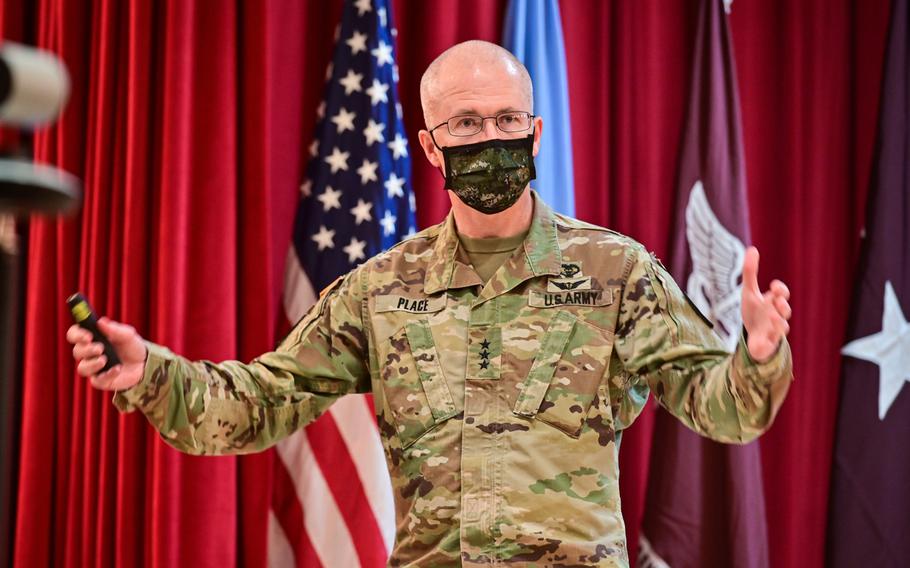
Lt. Gen. Ronald Place, director of the Defense Health Agency, speaks at a town hall meeting with staff and virtually Feb. 23, 2021, at Tripler Army Medical Center, Hawaii. (Caleb Barrieau/U.S. Army)
Stars and Stripes is making stories on the coronavirus pandemic available free of charge. See more staff and wire stories here. Sign up for our daily coronavirus newsletter here. Please support our journalism with a subscription.
FORT SHAFTER, Hawaii — Many of the Defense Department personnel opting out of receiving the coronavirus vaccine are doing so because they believe individuals at higher risk of complications from the disease should be vaccinated first, the director of the Defense Health Agency said Friday.
Speaking to reporters during a conference call while visiting Hawaii medical facilities, Lt. Gen. Ronald Place said that roughly a third of military personnel are declining to be immunized. Others are reluctant because there are no studies on long-term effects of the new vaccines, he said.
Despite the high opt-out rate, Place said over one million doses of the coronavirus vaccine have been administered to Defense Department personnel.
Progress in vaccinating has been steady, although some logical challenges, such as the winter storm that recently hit Texas, have slowed delivery, Place said.
“Our goal is to ensure that the overwhelming majority of our DOD dependents are offered the vaccine by this summer, enabling us to celebrate a renewed Independence Day,” he said.
The U.S. Food and Drug Administration authorized vaccines from Pfizer and Moderna on an “emergency use” basis — and for that reason, vaccination has remained voluntary for members of the armed forces.
Medical leadership has been assessing the reasons for vaccination refusal during “sensing sessions,” Place said.
“Many, and I mean many, of our uniformed health care team are very young — late teens, early 20s or into their mid-20s,” he said. “And many of them are saying, ‘Hey look, leaders: I’ve been working in this facility for months. I know how to take care of myself. I know how to keep myself safe. Use those vaccines on somebody who’s older or sicker who needs it worse than me. When there’s plenty of vaccine, I’ll come back to it.’”
Uncertainty surrounding possible long-term effects of the vaccine is also a significant factor in refusal, said Place.
“Even though there has been significant effort into evaluating the safety of the vaccine, the fact of the matter is that all of that is short-term safety,” he said. “The short-term safety profile is exceptional, but nobody — and I mean nobody — knows what the long-term safety is. So, for someone who is young and healthy and doesn’t have the long-term information they may want to know, it’s a rational question that they have.”
While Place said he understands this mindset, when counseling personnel he explains that there are also potential long-term negative consequences from contracting the coronavirus.
“Certainly, they don’t happen to everyone — but they do happen to some,” he explained.
Place stressed that many of the individuals opting out of vaccination “aren’t hard-over on the no.” Many express interest in being vaccinated at a later date, he said.
“What I can tell is that we have not run short of people who are interested in getting vaccinated,” he said. “It’s a good problem to have, right? Enough people who want the vaccine that everything you get goes into the arms of somebody who wants it.”
olson.wyatt@stripes.com Twitter: @WyattWOlson